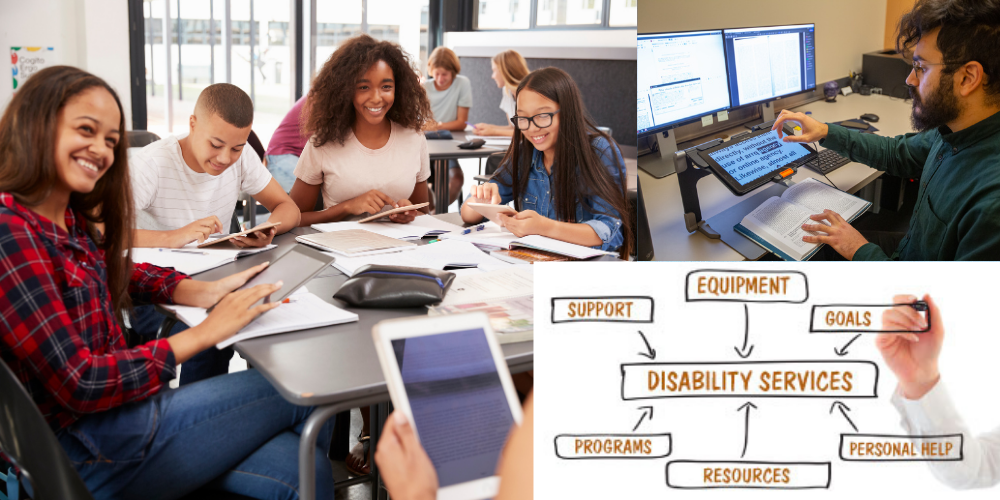Bookshare Student Forum: Advocating for Your Rights #BeyondtheBook
By Laura Deck, posted on October 29, 2020Three members of the Bookshare community share their advice as disability advocates on securing accommodations, getting accessible materials, and recruiting allies to succeed in the classroom and workplace
Navigating high school and college can be challenging, and for students with disabilities, the obstacles are even more formidable. That’s why learning how to self-advocate is crucial. On October 22, Betsy Beaumon, Benetech CEO, hosted a panel discussion with two students and a life-long disability rights advocate who shared their advice for obtaining accommodations, getting accessible materials, and enlisting teachers and staff to create pathways to success in school and beyond.

Panelists included:
- Katherine Schneider, PhD, an author, retired clinical psychologist, and originator of the Schneider Family Book Awards for children’s books with disability content
- Ben Cooper, a college sophomore with dyslexia studying honors engineering
- Luísa Monteiro-Oliveira, a high school student who is blind and is exploring college options
Betsy opened the discussion by stressing the importance of inclusion, advocacy, and justice for individuals with disabilities so they can benefit from the same rights that non-disabled people experience. As students move from high school to college and on into the workplace, their success depends on their ability to obtain accommodations that help them achieve independence.
What do you know now that you wish you knew then?
When asked what they wish they knew when they were younger, the panelists offered a variety of responses. Said Luísa, “I wish someone had educated me on specific rights for the disabled. I often felt embarrassed and guilty to ask for accommodations since I am blind. It’s important to learn the rights you are guaranteed by the ADA.” She also encouraged teachers and parents to push students with disabilities out of their comfort zone. “I’m shy and reluctant to talk to teachers, but my teacher made me do it, and I appreciate it now in hindsight,” she says.
Ben said that going from high school to college was a big transition. “Everything is new, you have a lot more freedom, and your parents and friends aren’t there to help you. “In college, you register at the DSS office and get a letter that outlines your accommodations such as extra time to complete assignments and handouts in accessible formats. Give the letter to your professors and discuss your needs up front.”
Dr. Schneider, who has been blind from birth, grew up before the ADA legislation was passed. Her advice? “Ask for what you need early and often. DSS offices are helpful, but view them as your back-up strategy. Get to know your instructors even if you are shy.” She encourages students to build a network of “friendlies,” so when plan A doesn’t work, you have allies who can help with plan B. She continues, “All these accommodations take extra time and energy. It’s not fair, and it can be scary, but you’re building valuable life skills for your resume.”
What is the best way to advocate for inclusion without incurring discrimination after disclosing a disability?
In Ben’s experience, some professors have unfavorable views on accommodations, so he doesn’t broadcast his requests to everyone in class; instead, he meets one on one with a professor in a private setting. “Think about the gains versus the disadvantages. I always want to perform to the best of my ability, so it’s important to request accommodations to succeed, even if a professor is disgruntled,” he advises.
Luísa encourages young students to address challenges from the start. “Speak up right away and establish rapport,” she says. “I will give my best if teachers give their best. Be polite, offer reminders, and if they don’t provide accommodations, it’s likely because they forgot and not intentional.”
Dr. Schneider has similar advice for the workplace. “After I graduated with a PhD, I sent 150 applications explaining what I can do and can’t do. Ask for as little as possible but as much as necessary.” She recommends preparing a two-minute speech explaining what you need. “For the employers who want to be fair,” she says, “they will be impressed. For those who don’t want to hire you, they will find a reason.”
“The forum felt like a breath of fresh air in a really difficult year. I enjoyed spending time with people who really understand the frustrations of getting accommodations and being a disabled person in a world designed for abled people.” – Event attendee
Benetech thanks the panelists for sharing their insights on facilitating positive change for people with disabilities and the attendees who submitted thought-provoking questions. Listen to the recording to hear the entire discussion.
Related Resources
Learn how Bookshare removes reading barriers for Ben, Luisa, and other students (video)
Learn more about Bookshare transition resources for students
Learn more about the transition toolkit for students with visual impairments
